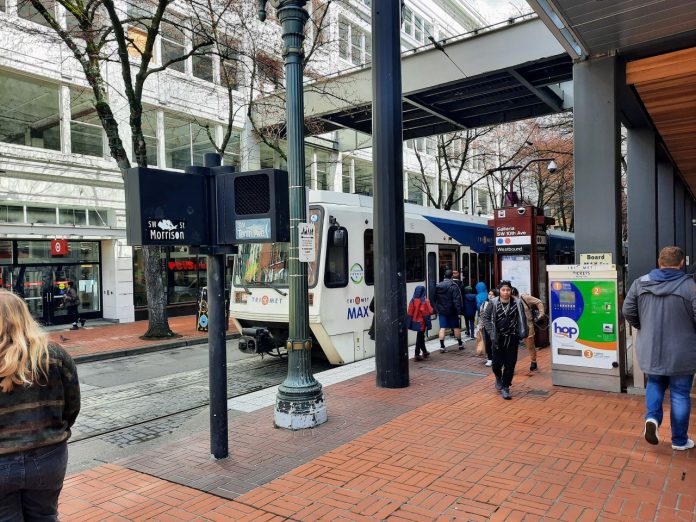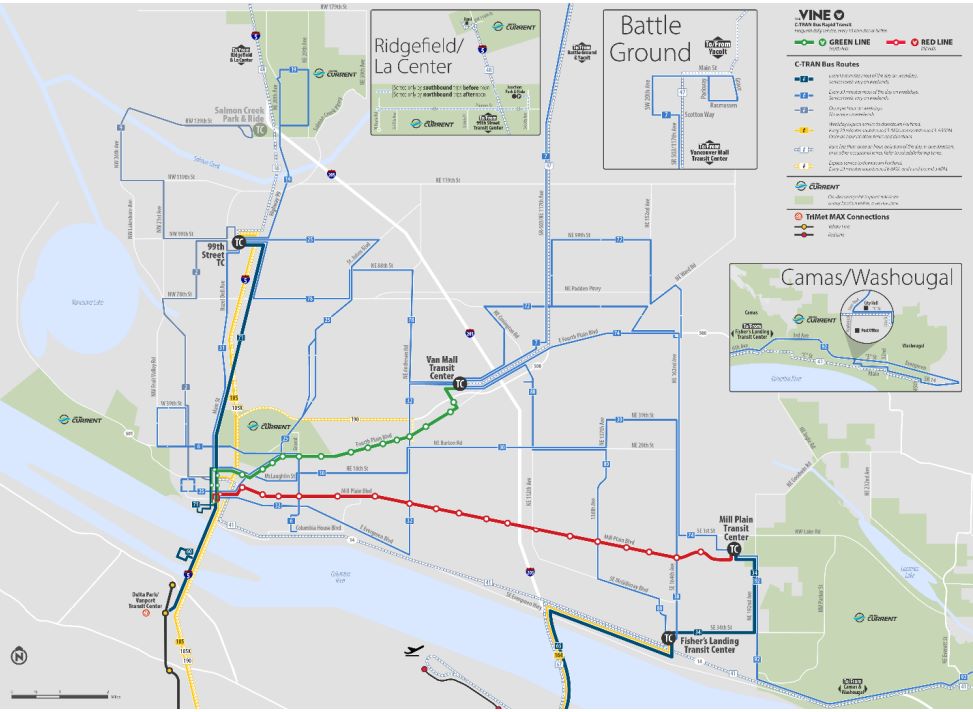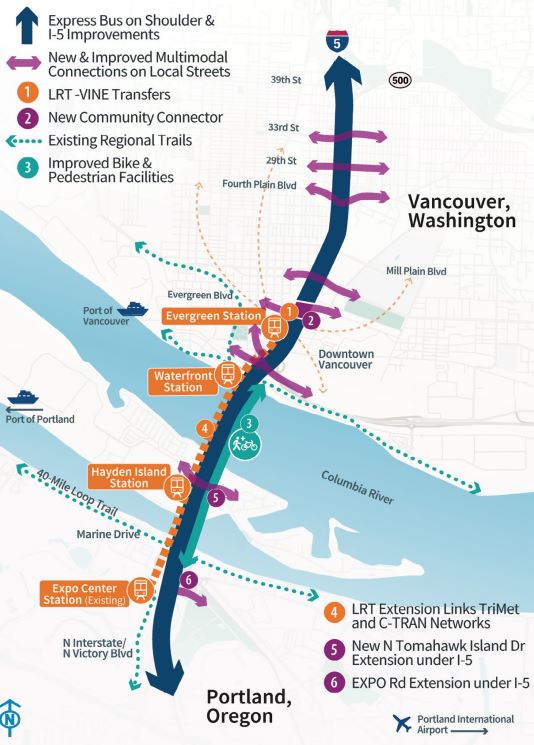
MAX funding fight blazes anew in Vancouver, Washington.
After the last attempt to replace the I-5 bridge between Portland and Vancouver stalled out due to Clark County Republicans’ opposition to bringing MAX light rail across the river, proponents hoped to have better luck, but a similar debate is erupting.
The new plan sought to keep the MAX on the bridge and sidestep the political quagmires and overcome Republican opposition. Even two decades later, Republicans are just as opposed. Despite the opposition, a freeway-running MAX light rail line into Clark County is slated to be part of the Interstate Bridge Replacement (IBR) project.
However, C-Tran, the transit agency responsible for operating buses in Clark County, is lukewarm on the project. C-Tran’s initial position toward the MAX was that they wouldn’t oppose its inclusion on the bridge, but they also would have no part in paying for either the capital costs or the operating expenses.
In December, Tri-Met revealed the full anticipated operating expenses for the MAX extension into Vancouver estimated at $21.8 million per year and they requested that C-Tran cover $6.8 million of that cost per year. In response, after some debate, the C-Tran Board of Directors voted to allow themselves to pay for some of the MAX operating expenses. They did not commit to an amount or funding mechanism and with the completion of the IBR still so far into the future, there was a lot of time to negotiate on both of those fronts.
If they covered the full amount Tri-Met asked for, MAX operating costs would represent around 6% of C-Tran’s projected 2025 operating budget. C-Tran would either need to come up with additional funding for the project or consider cutting back on the bus network they are building out.

One of the most likely solutions currently on the table for funding would be for Vancouver’s existing special transportation district to put a levy on the ballot to raise sales taxes in the city of Vancouver to cover the cost of the MAX. That would allow C-Tran to proceed with supporting the MAX without burdening taxpayers in the other Clark County cities who have been deeply opposed to the MAX for a long time.
Conservative backlash
Some conservatives in Clark County reacted very strongly to the news that Clark County taxpayers may be on the hook for the MAX as two city councils, Camas and Battle Ground, passed resolutions in response opposing light rail on the bridge entirely. The opposition campaign took advantage of the change in administration and the federal government’s changed outlook toward rail projects and began rallying against the decision. Republican state legislators ramped up their questioning of the inclusion of light rail or active transportation in the project.
Finally, Michelle Belknot, a Republican on the Clark County Council who is also on the board of C-Tran, introduced a resolution to revert C-Tran’s position to prevent C-Tran from contributing funding to the MAX at the board’s March 11th meeting. After lengthy public comment, the board decided to table the decision for a month so that each of the jurisdictions that sends a representative to C-Tran’s board could give instruction to their representatives on how to vote.
This also presents an opportunity for advocates to reach out to C-Tran leadership. If you wish to provide virtual or written comments to the C-Tran board, email sindy.quitugua@c-tran.org.
C-Tran’s board is made up of nine members, two from the Clark County Council, three from the Vancouver City Council, and one each from Battle Ground, Camas, and Washougal with the last member representing Ridgefield, La Center, and Yacolt. All four of the representatives for cities outside of Vancouver were instructed to vote for the resolution to prevent MAX funding while Vancouver instructed their three members to vote against it. That left the County Council as the final tiebreaker and, with one of their two representatives on the board having introduced the motion, it was looking likely to pass.

On March 12th, Clark County Council voted 4-1 to oppose the Republican-backed resolution and instructed their members to vote against it. Michelle Belknot made it clear to the board that she did not think she was bound by their resolution instructing her how to vote. In a follow-up vote, the Clark County Council voted to remove her as their representative to the C-Tran board 4-1. They shortly replaced her with another council member who pledged to oppose the resolution.
Councilmember Belknot has since filed suit in Skamania County Superior Court demanding to be reinstated before C-Tran’s next meeting.
How to keep MAX on track
While it appears there is a razor-thin 5-4 majority in favor of continuing to allow C-Tran to help fund the MAX, C-Tran’s next board meeting will ultimately decide the conclusion of this battle. If you live in Clark County, C-Tran will be considering the future of funding for MAX on Tuesday April 15th at 5:30pm at a board meeting in their offices.
It is imperative the five members opposing the resolution can show that there is substantial public support for the MAX in Clark County. You can sign up at the meeting to provide public comment in person, attend virtually, or provide written comment. If you wish to provide virtual or written comments, email sindy.quitugua@c-tran.org.
It is critical to continue following this story into the future, even if this vote fails. Even if C-Tran continues to allow themselves to pay for the MAX’s operating expenses, they still will not have committed to an amount or funding mechanism. Where the MAX line into Vancouver gets its operating budget would still be an open question with a long time between now and when the new I-5 bridge and MAX are set to span the Columbia.


